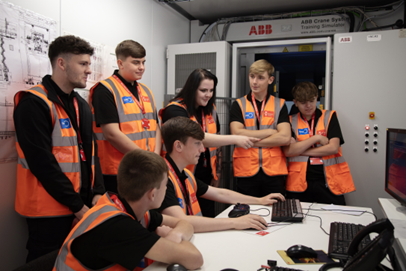PSS believes that to deliver safer ports, the combination of focus on skills and safety is vital. Whilst it is more obvious that sharing safety data, learning, and best practice will make ports safer; it is ultimately people – their skills, knowledge and commitment to a safety culture, that will make ports one of the safest places to work.
Skills ensure there is an adequate workforce, with the skills to work safely and the ongoing development to adapt to changing requirements. Sharing safety learnings and resources can only make ports safer if people are able to understand and implement them. Ports cannot become safer if people don’t know how to act safely. Port workplace culture must promote safety as the main driver for performance, and people and the main drive for safety.
In January 2023, a new skills strategy was launched which detailed how PSS would reposition itself over the next five years as the main port skills organisation, working alongside other wider maritime organisations.
After one year of implementation, the skills strategy was updated and revised into four key pillars that better reflect the work being requested by members. Updates on progress and stretch objectives were added where work had progressed outside of the original scope.
Pillar one: Entry routes into ports
Pillar one includes the cross-sector work and wider ports promotion on port careers. Maritime UK has been promoting careers throughout the UK re-branding the sector to make it more attractive and engaging for young people via Maritime UK Week, careers fairs, activities, website, case studies, etc. It is not the intention of PSS to promote or attend all career events but to work in partnership with Maritime UK, BPA and UKMPG to ensure that potential port workers know what skills they need to enter and progress in the sector. PSS will highlight the positive benefits and progression routes, and monitor the success of this promotion.
Pillar two: Progression routes
Pillar two includes qualifications and training to help the workforce progress.
It is crucial to demonstrate how progression can be achieved for port operatives and the typical skills, qualifications and training required to support progression to each level or role. This is a fundamental part of wider skills to ensure that ports have a skilled workforce. By highlighting progression, it helps support retention in the sector and the work in pillar one.
Pillar three: Current and future skills requirements
Pillar three includes data collection and analysis on the current workforce to identify skills gaps, shortages and training requirements.
Industry 4.0 is changing the way we work, and it presents huge opportunities. There is a focus on automation to increase safety and efficiencies as well as decarbonisation and green technologies to improve sustainability. New technologies mean that jobs will become less manual, and the skills required of the workforce will change. This will require upskilling and retraining of the existing workforce. It will help address some of the recruitment challenges by attracting a more diverse mix of applicants to fill new roles in digital, electronics and sustainability.
Pillar four: Skills standards
PSS is the standard setting body for port skills and this work includes developing and reviewing National Occupational Standards. Internal competency assessments already exist within some ports but are in the minority.
Skills Strategy
This five-year plan, fully updated in March 2024, demonstrates how PSS can truly take the lead on skills in the port sector, focusing on all the elements that support a strong, future-proof, highly skilled workforce. This includes understanding the long-term career needs for both new entrants and the existing workforce, promoting the sector by developing skills which allow port workers to maximise their employment opportunities and helping train the workforce to stay safe.
Port Skills Group and working groups
The Port Skills Group (PSkG) meets four times each year (two in-person and two online meetings) to bring together those working in skills-related roles such as learning and development, human resources and training in member organisations.
These meetings allow for valuable networking in addition to providing presentations on relevant topics.
PSS facilitates working groups to drive forward current projects in collaboration with members and to review qualifications, apprenticeships and National Occupational Standards with members and stakeholders.
Join Us
Find out more about the benefits of being a PSS member and how to apply.
Latest knowledge hub items
Case Study: Providing experiences in the workplace – industry placements
Members Only
Case Study: Support students – Careers talk at Peel Ports Group
Members Only
Case Study: Providing expert guidance – acting as a governor
Members Only

